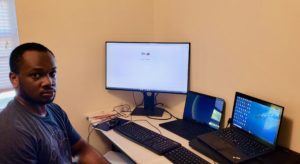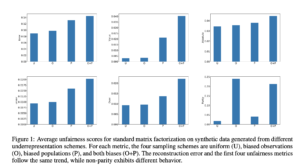Congratulations to Sanghani Center Spring 2021 Graduates

Virginia Tech’s virtual university commencement will livestream tonight, Friday, May 14, at 6:15 p.m., and degrees will be conferred at this time.
“We are extremely proud of our graduates who achieved their goals despite more than a year of a pandemic that upended much of their lives,” said Naren Ramakrishnan, the Thomas L. Phillips Professor of Engineering in the Department of Computer Science at Virginia Tech and director of the Sanghani Center for Artificial Intelligence and Data Analytics. “When everything went virtual, they continued to attend classes, meet with their advisors, conduct research, present papers at conferences, and work at internships — all testament to their perseverance and a good barometer of their future success .”
Following is a list of Sanghani Center graduates:
Ph.D.
Prashant Chandrasekar, advised by Edward Fox, is receiving a Ph.D. in computer science. His research interest lies in digital libraries. The title of his dissertation is “Continuously Extensible Information Systems: Extending the 5S Framework by Integrating UX and Workflows.” Chandrasekar will join the University of Mary Washington as an assistant professor in computer science.
Kaiqun Fu, advised by Chang-Tien Lu, is receiving a Ph.D. in computer science. His research interests lie in spatial data mining, machine learning, and graph neural networks, with a focus on social media analysis in intelligent transportation systems and smart cities. The title of his dissertation is “Spatiotemporal Event Forecasting and Analysis with Ubiquitous Urban Sensors.” Fu will join South Dakota State University as assistant professor in August 2021.
Yen-Cheng Lu, advised by Chang-Tien Lu, is receiving a Ph.D. in computer science. His research interests lie in anomaly detection and probabilistic modeling. The title of his dissertation is “Relational Anomaly Detection: Techniques and Applications.” Lu will be continuing his career as a software engineer at Amazon Alexa AI.
Sneha Mehta, advised by Naren Ramakrishnan, is receiving a Ph.D. in computer science. Her research interests are data mining and deep learning, especially for natural language processing applications. The title of her dissertation is “New Methods for Event Detection and Extraction from News Articles.” Mehta will join Twitter as a machine learning researcher in July.
Sathappan Muthiah, advised by Naren Ramakrishnan, is receiving a Ph.D. in computer science. His areas of interest include forecasting, machine learning, information retrieval, and topic detection and tracking (TDT). The title of his dissertation is “Design and Maintenance of Event Forecasting Systems”. Muthiah has joined eBay as an applied researcher.
Reza Sepasdar, advised by Anuj Karpatne, is receiving a simultaneous master’s degree in computer science and Ph.D. in civil engineering. (His master’s co-advisor is Maryam Shakiba). His research interests lie in the intersection of AI and computational mechanics. Sepasdar’s master’s thesis is entitled “A Deep Learning Approach to Predict Full-Field Stress Distribution in Composite Materials.” He will defend his Ph.D. dissertation, “Micro-mechanical Behavior of Fiber-reinforced Composites using Finite Element Simulation and Deep Learning,” this summer.
Sirui Yao, advised by Bert Huang, is receiving a Ph.D. in computer science. Her research interests include machine learning, recommender systems, and fairness. The title of her dissertation is “Evaluating, Understanding, and Mitigating Unfairness in Recommender Systems.” Yao will join Google in June 2021 as a machine learning engineer.
Master’s degree
John Aromando, advised by Edward Fox, is receiving a (coursework only) master’s degree in computer science. His research interests include natural language processing and information retrieval, particularly analyzing design specs written in natural language and synthesizing a machine-understood language via relevant descriptions.
Mohi Beyki, advised by Edward Fox, is receiving a master’s degree in computer science. His research interests are in deep learning, health care, and software engineering. The title of his thesis is “Synthetic Electronic Medical Record Generation using Generative Adversarial Networks.” Beyki will be joining Google as a software engineer this summer.
Yi-Chun Chang, advised by Chang-Tien Lu, is receiving a master’s degree in computer science. His research interest is in using social media analytics to detect threats. The title of his thesis is “RISECURE: Metro Incidents And Disruptions Detection Using Social Media And Graph Convolution.” He will join Walmart Global Tech as a software engineer in July.
Po-Han Chen, advised by Chang-Tien Lu, is receiving a master’s degree in computer science. His research focuses on using data from social media to help solve real-world problems. The title of his dissertation is “Metro Security Incidents And Threat Detection Using Social Media.” He will be joining Bloomberg as a software engineer this summer.
Yi Huang, advised by Jia-Bin Huang, is receiving a masters of engineering degree. His research interests lie in computer vision and machine learning. The title of his master’s project is “Cross-Domain Context-aware 3D Hand Pose Estimation.” Huang will join Qualcomm as a computer vision research engineer.
Kulendra Kumar Kaushal, advised by Naren Ramakrishnan, is receiving a master’s degree in computer science. His research interests lie in the field of natural language processing and information extraction. The title of his thesis is “Information Extraction of Technical Details From Scholarly Articles.” Kaushal will be joining Bloomberg as a software developer.
Prathamesh Kalyan Mandke, advised by Anuj Karpatne, is receiving a masters of engineering degree. His research interests lie in machine learning and computer vision. The title of his master’s project is “Fluorescent Image Reconstruction in Shape Controlled Cell Migration using Deep Learning.” Mandke will join Qualcomm AI Research as a machine learning software engineer in July.
Ashkan Nazari, advised by Lenwood Heath, is receiving a master’s degree in computer science. His research interests lie in artificial intelligence, deep learning, and cloud-based intelligence systems analysis. Nazari has also worked toward a Ph.D. in mechanical engineering. He will join the Silicon Valley-based luxury electric vehicle start-up Lucid Motors as a senior data scientist, working on developing intelligent battery initiatives.
Ioannis Papakis, co-advised by Anuj Karpatne and Abhijit Sarkar, is receiving a master’s degree in computer science. His research interests lie in machine learning, computer vision, robotics, and signal processing. The title of his thesis is “A Graph Convolutional Neural Network Based Approach for Object Tracking Using Augmented Detections With Optical Flow.” Papakis also won first place in the 2021 Paul E. Torgersen Graduate Student Research Excellence Awards MS poster presentation category. Starting in July, he will be employed by Bertrandt US, Inc., working at Audi in Santa Clara, California, as an advanced driver-assistance systems engineer.
Arya Shahdi, co-advised by Anuj Karpatne and Bahareh Nojabaei, is receiving a master’s degree in computer science. His research interests lie in forecasting and geospatial modeling and analysis. The title of his thesis is “Physics-guided Machine Learning Approaches for Applications in Geothermal Energy Prediction.” Shahdi is a supply chain data scientist at Lowe’s Companies, Inc.
Aarohi Sumant, advised by Edward Fox, is receiving a master’s degree in computer science. Her research focuses on deep learning and machine learning application, specifically in natural language processing. The title of her thesis is “Improving Deposition Summarization using Enhanced Generation and Extraction of Entities and Keywords.” Sumant will join Amazon as a software development engineer in July.
Omer Zulfiqar, advised by Chang-Tien Lu, is receiving a master’s degree in computer science. His research interests lie in social media event detection and natural language processing. The title of his thesis is “Detecting Public Transit Service Disruptions Using Social Media Mining and Graph Convolution.” He will join Walmart Labs as a software engineer in June.




